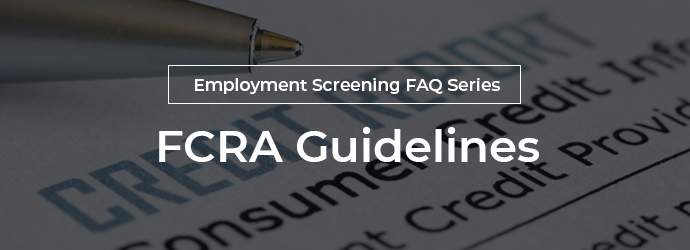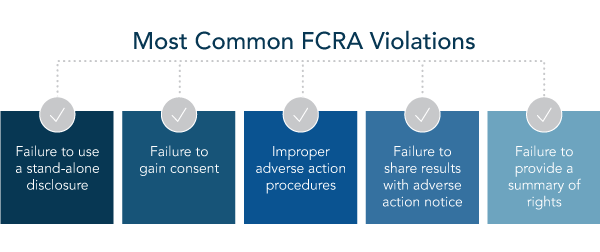4 min read
Employment Screening FAQ Series: Do We Have to Follow FCRA Guidelines?
![]() AccuSourceHR, Inc.
:
Mar 26, 2019 6:28:02 AM
AccuSourceHR, Inc.
:
Mar 26, 2019 6:28:02 AM

Today we continue our spotlight on some of the most frequently-asked questions we hear from employers concerning their use of employment background checks. This time, we focus on the federal Fair Credit Reporting Act (FCRA).
Let’s start with a definition. The FCRA of 1970 was enacted to promote the accuracy, fairness, and privacy of consumer information contained in the files of consumer reporting agencies. There is often confusion around if and how the FCRA applies to employment background checks and whether you, as an employer, need to be worried about it.
Question: Do all companies have to follow FCRA guidelines for employment background checks?
It’s important to understand that background screening reports are considered “consumer reports” under the FCRA when they serve as a factor in determining a person’s eligibility for employment, credit, insurance, housing or other permissible purposes. The reports may include information about a person’s criminal history, driving record, employment history, education, credit history, and other personal characteristics.
Answer: If you use a third-party screening provider, you must comply with FCRA.
The Federal Trade Commission (FTC), one of the agencies that enforces the FCRA, is quite clear: “When you use consumer reports to make employment decisions like hiring, promotion, reassignment and retention, the FCRA requires you to take important compliance steps.” The FTC further states that when employers use a third-party provider to conduct background checks, the employer is subject to the FCRA.
Understanding the FCRA Guidelines
To comply with the FCRA, employers seeking a consumer report on a candidate must take certain steps before and after ordering the background check. The FTC has summarized the steps, and we have elaborated on them below.
1. Disclose Intent
An employer must disclose in a stand-alone document that a consumer report will be used for employment purposes. The disclosure must be presented on its own, not as a part of an employment application. There have been class-action cases recently filed against companies who fail to adhere to this seemingly simple disclosure requirement.
2. Obtain Consent
The applicant or employee must agree to the background check by providing written authorization.
3. Use the Report for Its Specific Purposes Only
Background checks for candidates or employees may only be conducted to evaluate fitness for a position. Periodic checks (e.g., annual checks) can be made on current employees if they are switching positions or being considered for a promotion, or to assess changes in their background status. In each of these instances, the employee must also be aware of and provide consent for these types of routine checks.
4. Evaluate Against EEOC Rules
Once you have a background check in hand, you should review the findings in accordance with Equal Employment Opportunity Commission (EEOC) guidelines in order to avoid discrimination. The EEOC’s goal is to ensure employers do not discriminate against an applicant or employee, or otherwise misuse the information, such as by excluding people based on a protected characteristic, such as age or disability, or with certain criminal records.
In general, a candidate can’t be denied a job if a past criminal offense has nothing to do with the functions of that position. In addition, some states and localities have adopted so-called ‘Ban the Box’ laws, which generally forbid employers from asking about criminal records until late in the hiring process.
5. Follow Adverse Action Procedures
If you think you want to make the decision not to hire, retain, or promote someone because of something you found in their background check, you also need to be aware of two closely related rules under FCRA. The employer must provide a pre-adverse notification to the applicant notifying them that the information found in the background check may result in a no-hire or other adverse decision. This notice must include the opportunity for the candidate to explain or refute the findings before the employment decision is final. The notice should include a copy of the background check report the employer relied on, as well as a copy of the consumer’s Rights Under the FCRA.
If the information in the background check is not mitigated by information provided by the candidate or refuted, or if a refuted report is reinvestigated and no defect is found by the background check provider, the employer may make an employment decision based on the background check. The candidate must be informed of the decision. The notice must include contact information for the background check provider. This is called an adverse action notice.

How the FCRA Helps Employers
The FCRA helps employers in several ways:
Creates a Safer Work Environment
Failure to screen for convictions or — in the case of certain financial institutions — past disciplinary actions by financial regulators opens employers and their employees to physical, financial, and other workplace risks. These risks come in the form of theft, embezzlement, physical violence, sexual harassment, harm to your organization’s brand and reputation, and more. Implementing background checks, in compliance with the FCRA, can help mitigate these risks, and contribute to a safer workplace.
Avoids Costly Litigation
FCRA violations are expensive. A single litigant can sue for a combination of actual, statutory and punitive damages, along with attorney fees and costs. Actual damages have no limit, as long as the litigant can prove the harm.
Protects Against Class Action Suits
In an organization that makes high-volume hires each month, even one mistake in the hiring process can lead to thousands of potential litigants. For instance, recently a major rental car company was fined $2.7 million in a class action suit by 45,000 people for failing to file adverse action notices and a stand-alone disclosure.
Fosters an Inclusive Workplace
By casting the broadest net possible in hiring – whether it’s older adults, people with disabilities, or someone with a criminal record – you’re bringing a diversity of talents, backgrounds, and experiences to your workplace. This can lead to more innovation, higher productivity, and stronger team morale.
How the FCRA Protects Job Applicants
The FCRA helps provide assurances to job applicants and employees that they have the right to be informed and provide consent before a background check is performed. Furthermore, the FCRA provides a right to review the information and correct any errors. And finally, it gives them the right to know how their personal data is used in the hiring decision and to participate in that decision.
Hopefully, this summary of FCRA guidelines will help you better understand why it’s a good idea to design your processes with these principles in place. Your background screening provider should be able to help you understand these compliance obligations. Be sure to ask any new provider you’re considering how they build compliance into their processes and how they can help facilitate your organization’s compliance as well.
